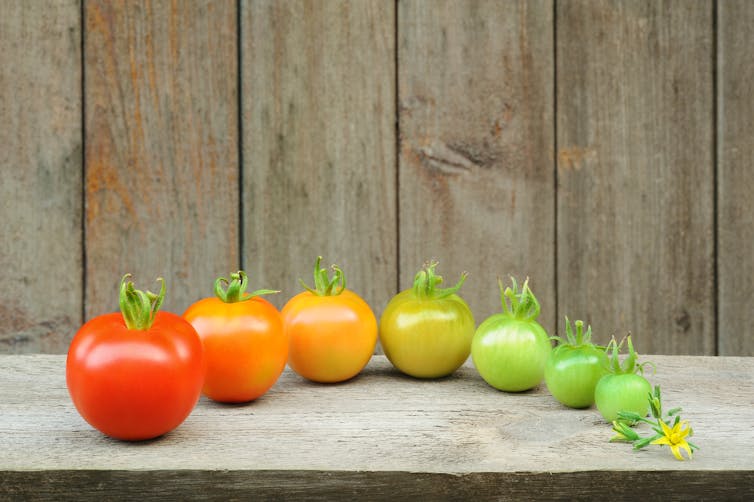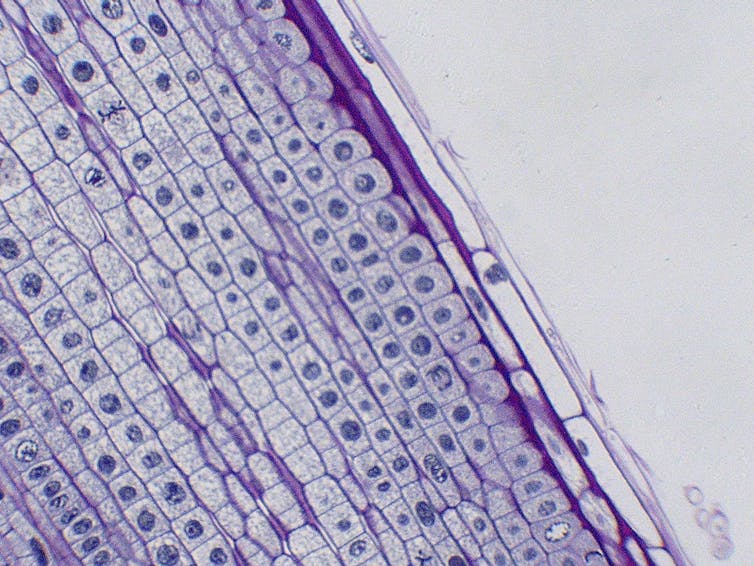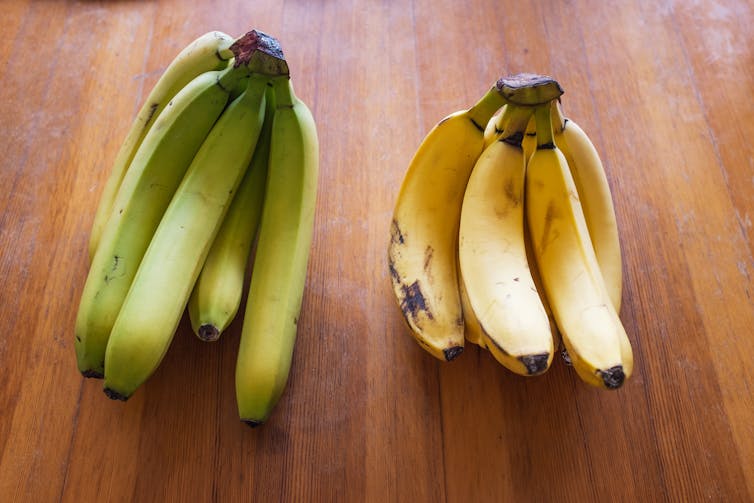what happens when fruit gets ripe?
- Written by Paul Holford, Professor of Agricultural Biotechnology, Western Sydney University
Curious Kids is a series for children. If you have a question you’d like an expert to answer, send it to curiouskids@theconversation.edu.au You might also like the podcast Imagine This, a co-production between ABC KIDS listen and The Conversation, based on Curious Kids.
What happens when fruit gets ripe? - Rachel, age 3, Melbourne.
Hi Rachel. You have asked a very interesting question.
Fruit ripening is all about plants getting animals to eat the seeds that are inside their fruits.
When the animals have finished eating, they move around and drop the seeds in a different place when they do a poo. This helps the plants get their seeds to somewhere new where they can grow into a new plant.
A fruit wants to be eaten but only when the time is right
But plants need to make sure that their fruits are only eaten when their seeds are ready to be spread around.
So before the seeds are ready, the plants make sure that the fruit are not easy to see and are horrible to eat. This means the fruits may stay green and may stay hidden among the leaves, so it’s harder to pick them. They are also very hard and bitter to taste, so animals (including humans) don’t like eating them.
 Did you know that tomatoes are fruit? This is what they look like when ripening at each stage.
Alena Brozova/shutterstock
Did you know that tomatoes are fruit? This is what they look like when ripening at each stage.
Alena Brozova/shutterstock
Read more: Curious Kids: how do tongues taste food?
When the seeds are ready, the fruit become ripe and good-looking, making animals keen to eat them.
When the fruit are ripe they become brightly coloured. Apples, strawberries and peaches become red, bananas become yellow and, of course, oranges become orange.
Next time you go the supermarket, look at the beautiful colours of the fruit in there and see how many different colours you can find.
Softer, sweeter and nicer to smell
At the same time as fruit change colour, they also become soft. This is because fruit are made from many tiny things called cells.
In plants, each cell has a wall. There is stuff in the cells’ walls that changes to make the fruit soft, and it is this softening that makes them juicy.
 Each of these boxes is a cell in an onion. And each cell is separated by a cell wall.
UAF Center for Distance Education/flickr, CC BY
Each of these boxes is a cell in an onion. And each cell is separated by a cell wall.
UAF Center for Distance Education/flickr, CC BY
I bet the thing you most like about fruit is that they are sweet and yummy to eat. When the fruits ripen, the plant cleverly removes all of the bad-tasting stuff from the fruit and replaces them with sugars. That, of course, makes the fruit sweet and nice to eat.
The last thing that changes when fruit ripen is that they make stuff that helps them smell really nice, which makes animals and people want to eat them.
Different fruits have different stuff in them that makes them smell the way they do. That is why we can tell a pear from a strawberry, just by smell alone.
Read more: Curious Kids: why do spiders have hairy legs?
A tricky gas called ethylene
These changes that happen when fruit ripen (the change in colour, smell, sweetness and softness) all happen at the same time.
To make this happen, many fruit use another special thing called ethylene. This ethylene is helpful.
The bananas you eat come from farms in Queensland. They are picked when they are green and a bit hard. They are picked before they are ripe so they don’t get damaged while they are being taken to shops near your house in Melbourne.
When they arrive in Melbourne, the people in charge of those green bananas will put some ethylene gas near them to ripen them up. Then they are put in shops so we can buy them when they are yellow and ripe to eat.
 You can see the difference between unripe bananas (left) and ripe bananas (right)
cryptographer/shutterstock
You can see the difference between unripe bananas (left) and ripe bananas (right)
cryptographer/shutterstock
The most important thing about all fruits is that they are very good for us.
The sugars inside them are a great way to get energy that helps us work and play all day.
They are also full of vitamins that help us become big and strong. So it’s important that we eat lots of fruit. But don’t forget your veggies, as they are also very good for us!
Read more: Curious Kids: Do butterflies remember being caterpillars?
Hello, curious kids! Have you got a question you’d like an expert to answer? Ask an adult to send your question to curiouskids@theconversation.edu.au
 CC BY-ND
Please tell us your name, age and which city you live in. We won’t be able to answer every question but we will do our best.
CC BY-ND
Please tell us your name, age and which city you live in. We won’t be able to answer every question but we will do our best.
Authors: Paul Holford, Professor of Agricultural Biotechnology, Western Sydney University
Read more http://theconversation.com/curious-kids-what-happens-when-fruit-gets-ripe-110797





